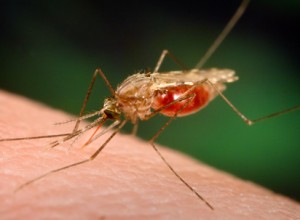Over 400,000 malaria-related deaths in 2020 due to irresponsive health systems
 The over 400, 000 individuals across the globe who died in 2020 as a result of malaria could have been saved, if some of the national health systems were more responsive.
The over 400, 000 individuals across the globe who died in 2020 as a result of malaria could have been saved, if some of the national health systems were more responsive.
Individuals and communities could also have helped in saving lives if people had been more active in taking up the responsibility of ensuring timely health care at the health facilities.
Sub-Saharan Africa is a high-burden malaria region and carries over 90 per cent of malaria deaths in the world.
The issues about the increase in malaria deaths and the call for a more robust approach to deal with the disease in the midst of the COVID-19 pandemic came up at a virtual media briefing for journalists across Africa.
The briefing focused on the importance of ensuring care-seeking behaviour for febrile illnesses particularly during the COVID-19 period.
The discussion featured insights from Dr. Kalu Akpaka, Regional Malaria Adviser for the African Region, World Health Organization (WHO) and Dr. Aboubacar Kampo, Director of Health Programmes at UNICEF.
The RBM Partnership to End Malaria and the African Media and Malaria Research Network (AMMREN) hosted the meeting.
According to Dr. Akpaka, the failure of national systems to deliver malaria services where and when people need them are worrying issues.
He noted that some people do not have access to test and treat malaria, while those who are able to get to the health facility sometimes are provided with inappropriate services such as not being tested before treatment for malaria.
He stressed on the need for individual and community responsibility and urged people to improve on their health-seeking behavior by visiting health facilities to be tested for every febrile condition in the midst of the COVID-19 pandemic.
Dr. Akpaka said people must embrace the call that zero malaria starts with each individual.
He urged people to be confident to visit health facilities when they have febrile conditions and discard the idea that they may contract COVID -19 or that they may be diagnosed with the corona virus disease.
He said safety and security have been intensified in all health facilities and health workers are well equipped with all the protocols to ensure that nobody seeking health care contracts the corona virus disease.
Dr. Aboubacar Kampo, on his part, noted that the COVID-19 pandemic affected the health-seeking behaviors of people last year, especially those who were experiencing fevers.
He said febrile conditions or fevers are not only associated with malaria or the corona virus disease but many other conditions such as typhoid and pneumonia are also associated with fevers.
Dr. Charity Binka, Executive Secretary of AMMREN, who served as a moderator at the meeting, noted that the malaria community were very quick to respond to the demands brought on by the COVID -19 pandemic and they ensured that malaria services were not disrupted.
During discussions, African leaders were urged to take play a front role in dealing with malaria to bring down the mortality and morbidity figures.
The meeting was organized against the background that like COVID-19, one of the most common symptoms of malaria is fever.
During the pandemic, the malaria community remained committed to supporting the prevention of malaria infection, illness and death by urging those with fevers to seek immediate treatment, rather than stay at home.
However, according to the WHO, delays in seeking treatment for fever are a key challenge facing Africa and posing risks to health.
Since 2010, malaria programmes have prevented over 75 million cases of febrile illness annually and have tested over two billion fevers.
It is vital that there is a strengthening of strategies tailored to increasing community awareness of malaria prevention methods, as well as early treatment-seeking behaviour to eliminate malaria.
By Eunice Menka
